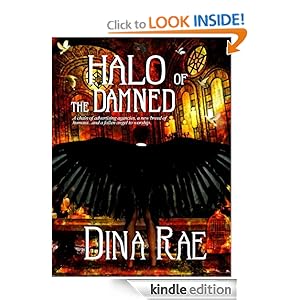 Our interview today is with Dina Rae who is the author of Halo of the Damned which is rated 4.6 stars on 23 reviews. Before we get to the interview here is a brief book description:
Our interview today is with Dina Rae who is the author of Halo of the Damned which is rated 4.6 stars on 23 reviews. Before we get to the interview here is a brief book description:
A chain of advertising agencies, a new breed of humans, and a fallen angel to worship… Andel Talistokov is known for his slick advertising agencies across the globe. He is a fallen angel that uses advertising as a weapon for Satan’s work. His growing power emboldens him to break several of Hell’s Commandments. Furious with his arrogance, Satan commands him to return to Hell after finding his own replacement. Yezidism, an ancient angel worshiping religion, quietly expands throughout the West. Armaros appears as a guest of honor during their ceremonies. He mates with young women to produce nephilim, a mixed race of humans and angels. They are alone and unprepared for their supernatural power. Joanna Easterhouse, a recovering drug addict, steps out of prison shortly after her mother’s fatal accident. She and her sister, Kim, unravel their mother’s secretive past. Intrigued, they learn their bloodline is part of a celestial legacy. Both worlds collide. Halo of the Damned is a horrifying tale that weaves research together with suspenseful twists and turns.
Interview with Author Dina Rae
1. What was unique about the setting of the book and how did it enhance or take away from the story? I have three main settings: Wheaton, Illinois, Lake Geneva, Wisconsin, and Florence, Italy Wheaton has more churches per capita than any town in the U.S. The story is about a fallen angel who uses religion to his advantage. Lake Geneva is a very fun tourist spot and Florence makes me think of art. One of the minor characters is an artist.
2. What specific themes did you emphasize throughout the novel? What do you think he or she is trying to get across to the reader? My main character, Joanna Easterhouse, has many good and bad traits. One of the major themes is not good vs. evil, but what is good and what is evil-are we stuck in a slot or can we change.
3. Do the characters seem real and believable? Can you relate to their predicaments? To what extent do they remind you of yourself or someone you know? The story is out there, but the characters bring it to reality. They are all bits and pieces of people I know along with my imagination.
4. How do characters change or evolve throughout the course of the story? What events trigger such changes? Lydia Easterhouse, the sisters’ mother, dies, leaving her daughters with an unbelievable legacy. Once they accept who they are and what they have, they become more powerful.
5. In what ways do the events in the books reveal evidence of the author’s world view? I’m a Christian with many hot potato questions. I also love horror. Religion mixed in makes the book a great read.
6. Did certain parts of the book make you uncomfortable? If so, why did you feel that way? Did this lead to a new understanding or awareness of some aspect of your life you might not have thought about before? Yes, absolutely. There is a scene at the church’s altar that made me squeamish to write. The sex scene was another first. It makes me aware of another writing challenge of something I always held as private.
7. Was there a basis for your story? A previous experience? Something else? I have a cynical perspective of the advertising industry and thought a fallen angel running things would add original interest to his character.
8. What research did you have to perform to back up your story? Any research which really opened your eyes or gave you new respect for a topic or profession? Lots of research in advertising, Yezidi religion, angel lore, Enoch, Jubilees, Bible, and Enochian keys. The research has given me more ideas. I am currently writing a sequel.
9. What is your method for writing a book? A certain amount of hours every day? A certain routine? Are you character/story builder or an outliner or some other method? I write and read daily without exception. Could be only a paragraph, but I fear that the manuscript will grow cold if I don’t keep going. And reading is constantly giving me new ideas on how to set up characters, settings, transition, etc.
10. How do you get past writers block or distractions like the internet? Turn them off.
11. Favorite book from childhood. Flowers in the Attic by V.C. Andrews This was the Twilight of the ‘80s.
Visit her blog: www.dinaraeswritestuff.blogspot.com
Visit the website: http://www.dinarae.co/
Follow on Twitter: @HalooftheDamned
Find Halo of the Damned on Amazon

No comments:
Post a Comment